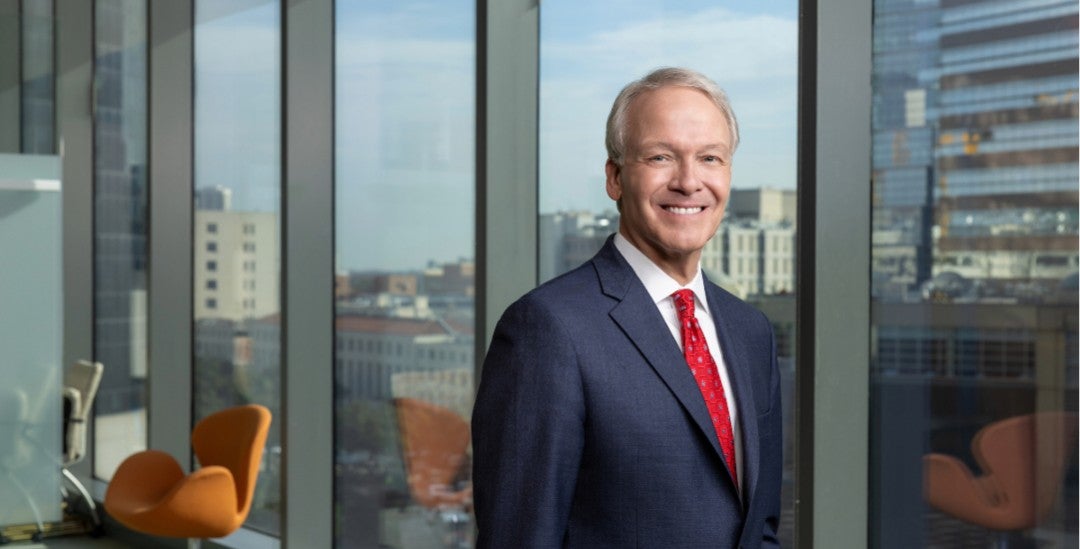Boom will receive the 2024 Stephen L. Klineberg Award for outstanding leadership in health care at the 2024 Kinder Institute Luncheon on May 20. Ticket sales close May 8.
Boom, who has been a Houstonian since he was 14, is still a practicing physician while also leading a hospital system that has over 32,000 employees and had over 2 million outpatient visits in 2023. He has served in his role since 2012.
Houston Methodist is among the best hospitals in the country and tied for No. 1 in Texas according to U.S. News & World Report’s Honor Roll released 2023. It was ranked in 10 specialties, more than any other hospital in Houston, with nine placing in the top 20 and two in the top five.
The Urban Edge interviewed Boom about Houston Methodist’s response to the COVID-19 pandemic, and the current and future state of health care in the Houston area. The interview has been edited for length and clarity.
What made you want to enter the medical profession and how did it bring you to Houston?
I always liked science in grade school. It kept my attention and sparked my curiosity. With a father who was an engineer, I initially thought I might become an engineer, but in high school, I began to pursue medical interests. At first, I thought I’d combine my love of animals with my love of science, so I worked part time at a veterinary clinic. But later, I decided I would prefer to work with patients who could talk to me.
Ultimately, that’s why I chose to be a primary care physician. The long-term relationships with patients — helping them through good times and bad — are what I find most meaningful. Now, having been in the profession for decades, I can say that working in medicine is a sacred calling. We are meant to help others, and that’s what keeps me in this profession.
As for Houston, I consider it home. Both my parents are immigrants from Belgium and moved to the U.S. right after they were married. My dad’s job eventually brought us to Houston when I was 14, and it’s a remarkable city. I graduated from Baylor College of Medicine and did my residency on the East Coast, but I always knew that I wanted to come back.
What measures taken by Houston Methodist during the height of the COVID-19 pandemic are you most proud of?
Houston Methodist is an independent academic medical center, a very unique structure within the field. The advantages of this structure were on full display during the COVID-19 pandemic as we were extremely nimble and effective. For example, we developed a COVID-19 PCR test just a couple of weeks after the virus was discovered in China so that when the first cases hit Houston, we were able to get an answer in a couple of hours when most institutions were sending tests out to get answers in days to a couple of weeks.
We were the first in the world to use convalescent plasma in March 2020. We have sequenced the viral genome of every patient who tested positive, which has allowed us to have one of the largest databases of viral genomes in the world and has enabled our teams to gain valuable insights into the spread of the virus. We administered more monoclonal antibody infusions and more vaccines than any institution in the state of Texas. And, of course, we were the first medical institution to mandate the COVID-19 vaccine for our employees and physicians. It was courageous, and it was the right thing to do to protect our patients.
I am so proud of our Houston Methodist family for pulling together and rallying around this call to get vaccinated. There is no doubt in my mind it saved countless lives. To this day, when I meet hospital executives around the country, they are quick to thank Houston Methodist for leading the way.
Most of all, I’m proud of how we were able to look out for our people. We are fortunate to have a strong balance sheet at Houston Methodist. So, we committed early to no layoffs, no furloughs, no benefit cuts and no pay cuts — aspects that have reinforced our culture. We also invested heavily in support of our heroic employees and physicians who put their personal lives on hold to care for our community.
The pandemic made for a challenging time for the medical profession. What do you think are the best methods to confront burnout and the state of the workforce?
There’s no doubt the pandemic was very challenging for medical professionals. At Houston Methodist, we’ve worked hard to confront burnout. What is most important is connecting people to the passion and purpose we all derive from the sacred privilege of caring for others. When we think in terms of work-life integration rather than work-life balance, which implies that we choose one over the other, we can focus on how best to bring back the joy in medicine. Like everything that has to do with culture, it requires a very purposeful and deliberate approach.
At Houston Methodist, we’re seeing the results with employee engagement at the 96th percentile nationally, significantly reduced turnover and an embracing of many creative solutions, like a virtual nursing program that offers different career options for our nurses while easing some of the workload on those nurses who are at the bedside — all while improving safety and quality. Combatting burnout is not a quick fix, and the best way to confront burnout is to care for the whole employee. We have an entire program to combat burnout and teach resiliency to our physicians. Houston Methodist also has an employee well-being clinic that brings mental health support directly to our employees. It makes a huge difference to know you’re not alone.
Houston is renowned for its world-class Texas Medical Center. However, over 1.3 million people in the Houston metro area are uninsured, according to the U.S. Census Bureau & Kinder Institute For Urban Research's Urban Data Platform Team. How would you describe the disconnect?
This is a big issue, one that’s frankly at an existential level for our society. How can we be the wealthiest, most successful country on the planet yet still have so many people uninsured? Why is health care in the United States the envy of the rest of the world, but only if you have access to insurance? I wish we as a hospital system could solve it individually, but this will require a concerted effort that starts with an important societal discussion.
Unfortunately, these conversations are difficult to have in today’s contentious and divided environment. This is why I speak so much about an “and” mentality, one in which diverse individuals with different points of view come together, hammer out compromise and do what’s best for the American people. I firmly believe this is possible in health care.
In the meantime, at Houston Methodist, we focus on what we can impact. We provide hundreds of millions in direct charity care at cost. We provide well over $1 billion in community benefits. Through our Community Benefits Grant Program, Houston Methodist provides uninsured and underinsured patients improved access to health care services, mental health services and financial support. We have partnered with free clinics, federally qualified health centers and other nonprofit agencies in the Greater Houston area for more than 30 years as part of this program. Just this year, we awarded nearly $6.8 million in community grants to 30 local nonprofit organizations. The Community Benefits Grant Program allows us to continue to address crucial community issues, including reducing barriers to accessing primary and preventative care.
What high-level investments are needed for Houston to remain a leader in medicine in the future?
A continued investment in technology, infrastructure and people is a must for Houston to remain a leader in medicine. There is a tremendous opportunity to scale innovative treatments and technologies thanks to the large, diverse clinical base that we have in Houston. And if we continue to work together and work across industries, we will stay a leader in medicine.
A great example is the Ion District, an area in the middle of the city where Houston Methodist and Rice University both have a presence. The Ion gives us the chance to test the latest innovations in health care technology with the bonus of collaborating with experts from across industries, such as aerospace, energy, and oil and gas. That kind of collaboration works in everyone’s favor and positions us to bring treatments and innovations to our patients first.
How can the Houston area be prepared for another pandemic or large-scale public health emergency?
Several years before COVID-19, Houston-area hospitals prepared for an Ebola outbreak in Houston. Fortunately, we didn’t see any patients, but that taught us the importance of preparing for a global infectious disease. We had set up an inpatient isolation unit for Ebola patients. When we started getting our first COVID-19 patients, we used that facility to control infection. Now, we aren’t waiting for the next pandemic; we’re preparing for it. We’re using what we learned from COVID-19 to prepare for how we’ll respond to the next public health emergency.
At Houston Methodist, we expanded and invested a lot of resources into our infectious diseases department. We also still collect data to inform us on how to anticipate and treat future infectious diseases. In the Houston area, it’s about investing in the resources and the people who have the expertise now so that we can mitigate the effects of the next public health emergency.
How does being a practicing physician help you stay connected to those who are seeking care at Houston Methodist?
When I was in business school, I knew I wanted to remain a practicing physician no matter where my career took me. When the administrative side of my work ramped up even further in 2004, I took my active primary care physician practice of more than 1,000 patients and decreased it significantly. Since then, I have had a very small practice with the same patients I’ve been seeing for decades.
Being a practicing physician allows me to use the technologies that our employees and physicians use. For example, when we transitioned to a new health record management system, I had to learn it because I used it for my practice. I order tests, consult with radiologists and do all the things other primary care physicians do. It allows me to see how patients experience care at Houston Methodist in a tangible way. And at Houston Methodist, the patient is the center of everything we do. When I’m caring for a patient, that brings me back to that sentiment.


